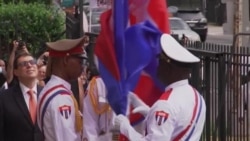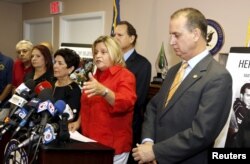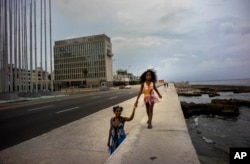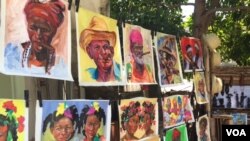U.S. Secretary of State John Kerry has arrived in Havana, Cuba to watch Marines hoist the U.S. flag at the American Embassy there, a move marking the ceremonial re-opening of the facility as part of broader U.S.-Cuba re-engagement
Both the U.S. and Cuban embassies re-opened on July 20.
The Cuban government hosted a lavish event for its re-opening last month, but the U.S. chose to hold off on its formal ceremony until Kerry could lead a delegation to Havana.
Kerry, who becomes the first U.S. secretary of state to visit Cuba in 70 years, will be accompanied by some members of Congress and three elderly former U.S. Marines who lowered the flag for the last time in Havana in January of 1961.
The daylong ceremony in Havana will include a series of events with U.S. lawmakers and other government officials, Cuban government representatives and civil society members, a senior State Department official said.
“There are people going to Havana for this event who have not been to Cuba before and that includes some Cuban-Americans, and that has to be incredibly emotional,” the official said during a briefing Wednesday.
However, there is no planned meeting between Kerry and Cuban President Raul Castro, the official said.
Dissidents not invited
The senior official indicated that Cuban dissidents would not be part of the flag-raising ceremony at the U.S. Embassy.
“It is principally a government-to-government event,” the official said, “signifying this new relationship and the re-opening of the embassy.” But members of the Cuban civil society, including political, human rights and media activists have been invited to a second, larger ceremony later Friday at the residence of Ambassador Jeffrey DeLaurentis, the U.S. Chief of Missions.
Kerry, in an interview with CNN, said that "we’ll have an opportunity where there is a broader perspective to be able to meet with ... a broad cross-section of Cuban civil society, including dissidents."
A Cuban-American human rights advocate based in Washington said the U.S. move to normalize relations with Cuba may be a set-back for Cuban dissidents.
“It is a fairy tale to assume that just because the president [Obama] makes concessions to Raul Castro, then Raul Castro will behave and stop abusing the people of Cuba,” said Frank Calzon, head of the Center for a Free Cuba.
Citing the Cuban government’s continued arrests of anti-government protesters and dissidents, he said the Castro government had been “emboldened,” because it had yet to receive U.S. pressure to improve human rights.
Kerry stressed that human rights issues are “at the top of our agenda in terms of the first things that we will be focused on in our direct engagement with the Cuban government.”
In a letter to the secretary of state this week, Reporters Without Borders noted that Cuba ranks 169 of 180 nations on its 2015 press freedom index.
U.S. lawmakers react
Some U.S. lawmakers have also questioned the Obama administration’s decision to move forward with engagement, in the wake of human rights concerns.
“We [the U.S.] are so hungry for this deal that we are willing to overlook a hundred peaceful dissidents arrested just a few hours before the opening of our embassy,” said Congresswoman Ileana Ros-Lehtinen, a Cuban-American.
“It is a cruel insult to the freedom loving people of Cuba and it is a dangerous situation for U.S. national security,” Ros-Lehtinen said at a Wednesday news conference in Miami.
Other lawmakers have expressed support, including, Senator Patrick Leahy.
“Finally, after 55 years a failed, punitive and ineffective policy of isolation is ending,” he said in a July statement, reacting to plans to re-open the U.S. embassy in Havana.
Impact
The embassy reopening will allow more Americans to travel to Cuba and give Cubans increased access to the U.S. embassy in Havana.
But Cubans may not see much of an immediate difference in their day-to-day lives.
“In the immediate short term, it won’t benefit the ordinary Cuban very much except to give them some hope,” said Philip Brenner, an international relations professor at American University who has traveled to Cuba more than 30 times.
Brenner said Congress would need to lift the U.S. trade embargo on Cuba for them to see significant change.
“The big impact on the lives of Cubans is the embargo and to the extent that the United States and Cuba can now work towards ending that embargo ultimately will benefit them.”
Obama has expressed support for lifting the embargo, first imposed on Cuba in the 1960s.










